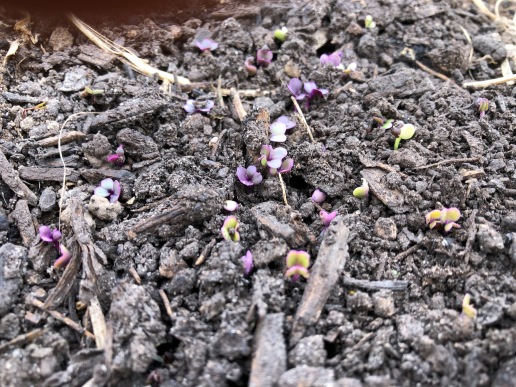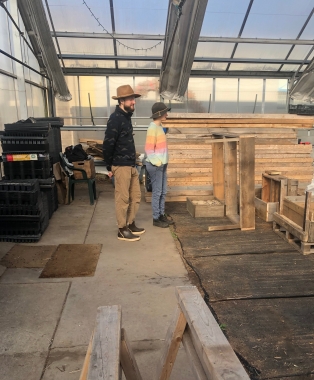The Legacy of Folk Wild
On Monday morning, I was bored driving truck, and got the sudden impulse to call my friend Matt Mosca — the first organic farmer I ever worked closely with, whom I hadn’t spoken to in over a year. He didn’t pick up, so I left a voicemail, wishing him well at the onset of a new farming season.
Two hours later, my phone rang. Wild Folk Matt. I picked up, and his voice immediately brought back a flood of warm, sunlit memories. We talked and talked. He gave me his update from three years of hopping coast-to-coast in various farming and cooking ventures, and I talked of my settling down with a house and daughter and co-ownership in a farm. He was, it turned out, on the verge of a settling-down himself, and on the road from Washington back to Maine, where we’d met.
We were probably half an hour into our conversation when I sparked the question. “Dude, so where are you right now?” The short answer: The Badlands. The long answer: If I drive an extra hour or two north, I could be to your place by tomorrow afternoon. I’ve already recovered from Covid, so that shouldn’t be a concern.
We set the plan and hung up as he lost service. Absolutely ecstatic, I called Fanni to relay the news. See, Matt Mosca holds a special place in our lives. We encountered him, Farmer John Clay, and Uncle Ben at Wild Folk Farm in Benton, Maine, in what was our first ever farming venture – a WWOOFing road trip on the east coast in the summer of 2016.
The trip itself was supposed to be a place-holder; a novelty page in the scrapbook of life. We would have this little adventure working on some organic farms for the summer, then return home and get on with our professional lives. That all changed when we encountered the Wild Folks, and their land. On the first evening we arrived, the space was unoccupied, so we took a solo tour. The energy was tangible; the life-force was intoxicating and the freedom was palpable. Alone in the space, we wandered and pondered. Who were these people, and how did they manage to create a space like this? How did the rest of us manage to live without spaces like this?
The next morning, we awoke in our tent and encountered the Wild Folks in their quasi-outdoor kitchen with the occasional chipmunk bomber and strange opaque Nas tarp roof. For the better part of a month, we inhabited this space and lived with these folks. Matt and John patiently and enthusiastically opened up their worlds of knowledge to us – demonstrating harvesting methods for different greens, or explaining the science behind their homemade fertilizers. Day-in, and day-out, they demonstrated passion and love for their profession of farming. They cooked meals I’d never have imagined, with ingredients I never knew existed. Having just finished my internship and become credentialed as a Registered Dietitian, I quickly realized that these guys were the nutrition experts. Farmers as nutrition experts. I’d never have guessed.
But more so than that, they were free. Coming from the tight-springed hallways of dietetics coursework, I had never met anyone with so much freedom. These guys grew their own food. They knew how to cook it. They knew how to build. They knew how to work, and the work they loved. What could you possibly take from them? They woke every morning to the work, and approached it with their whole hearts. And so did Fanni and I. We built a comfortable living space on the open-air mezzanine in the back field. We built a funky shelf and named her Priscilla Wilde. We weeded, and picked more strawberries than you could count. I mulched, and mulched, and mulched, and wrote all about it. We cooked and ate and drank and sang by campfires. We lived a lifetime of experience in three short weeks. When our stint with the Wild Folks came to an end, we went on to a couple more farms, and then back to the professional lives we’d thought we sought.
But the ambiance of that freedom hung with us, like the echo of sound around a church bell, and haunted every effort which drew us away from farming. I worked jobs and more jobs; never finding satisfaction. We struggled with bouts of depression, trying desperately to fill the void with a small garden and one-off work days with other farmers. We were hooked. Unbeknownst to us at the time, the trajectory of our lives had been irrevocably altered. Today, four years later, our outlook and lifestyle bears little resemblance to anything we could have imagined prior to our encounter with the Wild Folks.


Then, on a random Tuesday afternoon, Wild Folk Matt himself walked through my front door. His aura hadn’t changed, and the kind crinkle still inhabited the corners of his eyes when he smiled. He and Fanni went almost directly to the kitchen, as I knew they would – cooking ribs, and talking sourdough. He interacted with the space as if he’d been here the whole time. I put on some music. We played a crazy Korean card game he’d brought. We walked through the back yard, looking at our various cherries and berries and talking farming, life, landscaping and love. We assembled a grab-bag of goodies available only here in Stevens Point, Wisconsin. Clover Meadow Yogurt; Liberation Chorizo; Upstream Cider; Main Grain Pastry Box; Dairy State Cheese Curds.
That night, we feasted. Kelly and Asher joined us, and we explained Kelly’s role as the coordinator of the Curbside Compost program. We talked about Asher’s transformation of a dumpster bicycle into a foot-driven belt-sander, and his current role as a project manager for a new construction cooperative started in town. The next day, we drove out to the farm, explaining some community dynamics along the way. We stopped at the Cider Haus to grab some things. “Yeah, so this is where that cider is made. A couple of our farm co-owners run this business… so they are actually moving into a new, cooperatively owned location, along with the owner of the Main Grain, and a few other local businesses… so the guy who gave us our box at the Main Grain is also a farm co-owner, and he’s the chair of the food Coop Board of Directors… we are going to raise laying hens this year, to sell eggs wholesale this season to some people who have started an egg-washing cooperative…

On and on. As our conversation went, I couldn’t help but make the realization. I love this place. We got out to the farm and moved some tarps around while we talked about the ups and downs of our structure, and the season thus far. Again, equally comfortable in kitchen or field, he moved through the space as if he’d helped build it up from the beginning. It was refreshing to talk with another farmer from the outside, and get his perspective. “Man,” I told him as we finished our small project. “It’s good working with you again.”
Then, just as suddenly as he’d arrived, Matt Mosca was gone – on the road to Madison, then to Pennsylvania, and then to Benton, Maine, to reconnect with Farmer John and get back to it, on the land where it all started. Still, a beautiful echo remains here in his wake; a subtle buzz of love and positive energy. His time here has reminded me of why we do what we do, and how we learned of the possibility of freedom. Our lives will never be the same, and for that, I am eternally grateful. And in some small way, through the work of Fanni and myself, the example of the Wild Folks lives and thrives here, today, in lovely Stevens Point, Wisconsin. I wish them better than well.
